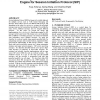Free Online Productivity Tools
i2Speak
i2Symbol
i2OCR
iTex2Img
iWeb2Print
iWeb2Shot
i2Type
iPdf2Split
iPdf2Merge
i2Bopomofo
i2Arabic
i2Style
i2Image
i2PDF
iLatex2Rtf
Sci2ools
108
click to vote
ANCS
2007
ACM
2007
ACM
A programmable message classification engine for session initiation protocol (SIP)
Session Initiation Protocol (SIP) has begun to be widely deployed for multiple services such as VoIP, Instant Messaging and Presence. Each of these services uses different SIP messages, and depending on the value of a service, e.g. revenue, the associated messages may need to be prioritized accordingly. Even within the same service, different messages may be assigned different priorities. In this paper, we present the design and implementation of a programmable classification engine for SIP messages in the Linux kernel. This design uses a novel algorithm that in addition to classifying messages can extract and maintain state information across multiple messages. We apply the classifier for overload control using operator-specified rules for categorizing messages and associated actions, augmented with a protocol-level understanding of SIP message structure. When faced with loads beyond their capacity (e.g., during catastrophic situations and major network outages), SIP servers must dro...
| Added | 12 Aug 2010 |
| Updated | 12 Aug 2010 |
| Type | Conference |
| Year | 2007 |
| Where | ANCS |
| Authors | Arup Acharya, Xiping Wang, Charles Wright |
Comments (0)

